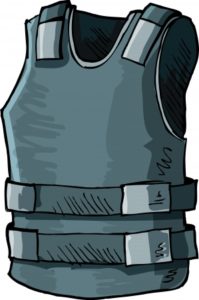Is There a Need for Body Armor in Process Serving?

Nobody will deny that working as a private process server can be a difficult job. Process servers by nature deliver papers of sensitive nature that the recipient typically does not want to receive. While most people can be logical enough to realize that the process server is simply a delivery messenger and has no involvement in the action being taken by the court papers, others interpret the process server as the main enemy and act accordingly. Enduring hurled insults, physical violence, and dangerous threats are often a daily part of a process server’s day.
This is exactly why process server Billy Earle has worn a bulletproof vest while on the job over the last 26 years. Earle has experienced assault, had firearms pointed at him, and was even once chased by a man wielding a shovel. It is only fair that Earle is given the freedom to protect himself, but that freedom has recently been stripped by Her Majesty’s Penitentiary in Newfoundland, Canada.
Earle explained that he has always worn his body armor on all jobs, even when serving people in the Pen, but recently arrived to serve papers to a prisoner and was told a staff member would need to deliver the papers for him. The staff member signed an affidavit swearing that the papers were successfully served, but relying on this type of middle man makes Earle very uncomfortable, and for very good reason.
If the prison staff members are too busy to help Earle, or if the papers are not delivered as promised, then the responsibility falls on Earle’s shoulders. He could lose business from clients, which would threaten his livelihood. After inquiring about this decision, Earle was told that only peace officers entering the correctional institutes are permitted to wear equipment like bulletproof vests, and Earle doing so would breach security protocol. Now, the question is, as a man doing an often dangerous job, should the protocol be altered to accommodate his safety?
